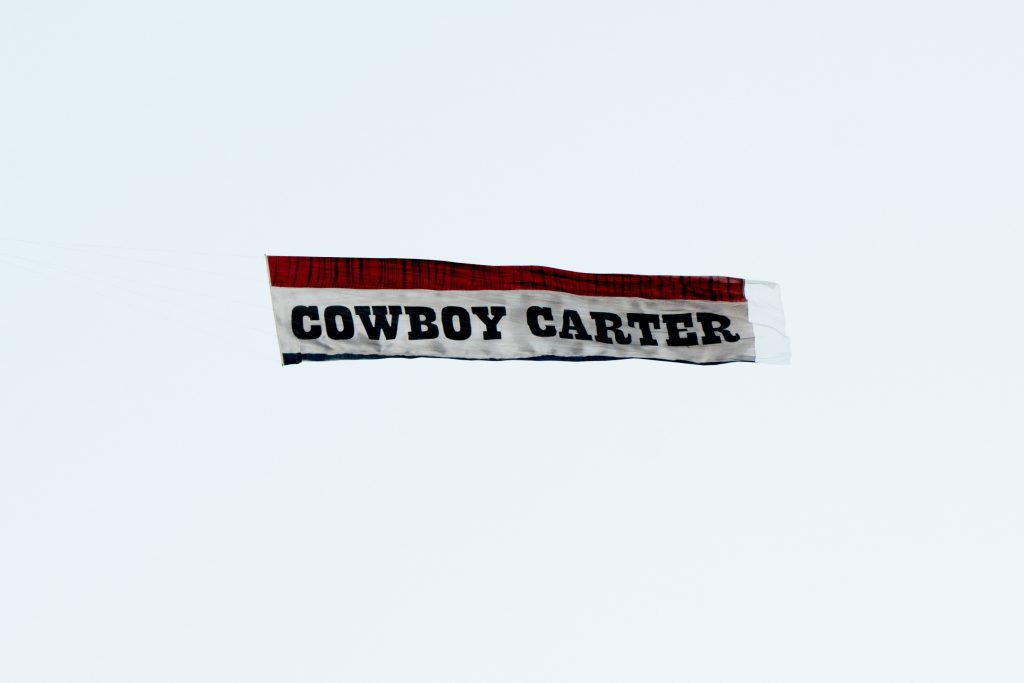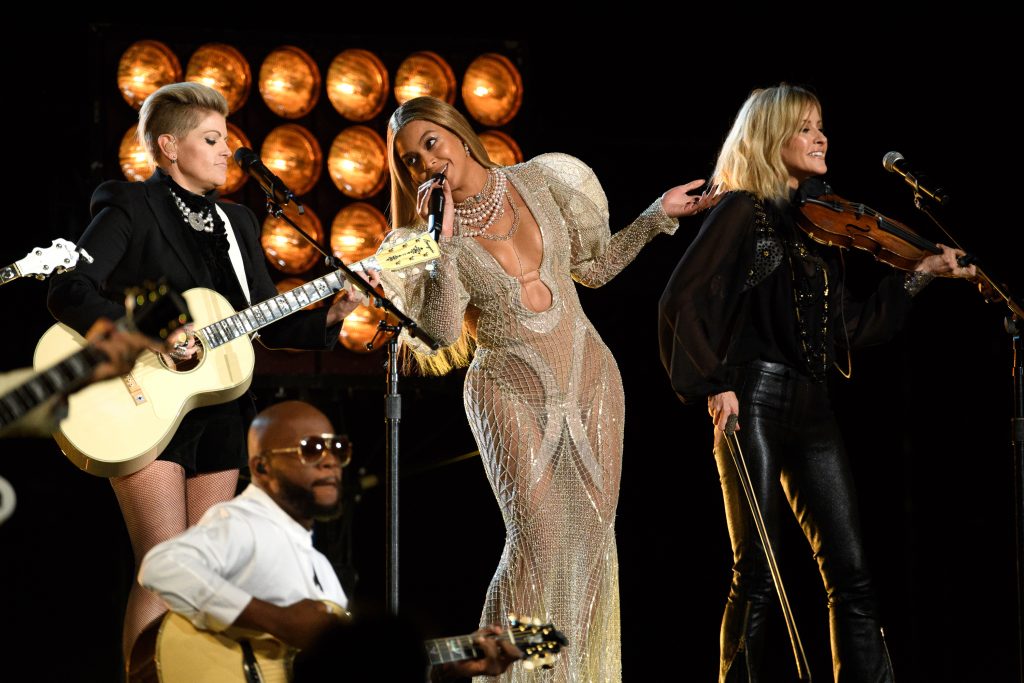A month of Cowboy Carter
A month of ‘Cowboy Carter’
Review: With her first-ever country album, Beyonce declares a death to old ideals while revealing roots of an entire new image.

“Genres are a funny little concept, aren’t they?” are the words spoken by the legend Linda Martell on the 12th track (titled “SPAGHETTII”) of Beyonce’s country music manifesto, COWBOY CARTER. Martell made history as the first Black woman to perform on the Grand Ole Opry in 1969. Due to harassment and relentless racial taunting, her budding country career quickly spiraled downhill as she was subjected to shady business dealings and forced to fall back into the shadows of a genre her ancestors once helped to originate. That genre had now been co-opted by cowboys of a different color. 47 years later, COWBOY CARTER herself experienced a similar run in with those of the now fully gentrified genre. After an invitation to perform her country track “Daddy Lessons” at the Country Music Awards, The Chick’s (who Beyonce invited to perform alongside her) said Beyonce was mistreated backstage after their performance. The CMA’s reportedly received much backlash due to the performance, leading them to remove it from their site (only to later repost it.) Prior to releasing COWBOY CARTER, Beyonce stated in an Instagram post that this album was five years in the making and was inspired by an experience where she didn’t feel “welcomed,” leaving many to speculate that this new offering was her, once again, turning her lemons into the most bittersweet lemonade.

In the “SPAGHETTI” track on the album, Martell goes on to say, “In theory, they [genres] have a simple definition that’s easy to understand, but in practice, well some may feel confined.” The meaning of this line ricochets out,hitting the very social constructs and constraints of race, and gender that have also been placed on Martell and Beyonce as two Black women. With COWBOY CARTER, Beyonce leads this personal yet political assignment, and declares a death to old ideals while revealing roots of an entire new image.
“Nothing really ends/for things to say the same they have to change again,” Beyonce sings on COWBOY CARTER’s opening track “AMERIICAN REQUIEM.” With velvety layered vocals, Beyonce starts the processional for the proclaimed death of these old ideals. “There’s a lot of talking going on/while I sing my song,” she continues as the sitar played by Jon Batiste (who also co-wrote the song) begins to string. With this, Beyonce seemingly reveals her internal thoughts occurring during that CMA incident. “Can you hear me?/I said ‘Do you hear me?” she continues. The instruments and the vocal acrobatics showcased in this song are some of Beyonce’s strongest and for a country album opener, is also very rock influenced. “REQUEIM” (which was also interpolated by protest song, “For What It’s Worth” by Buffalo Springfield) also makes an argument to be her very own “Bohemian Rhapsody.” Beyonce brings the over five-minute opener to a denouement of sorts with lyrics “I am the one to cleanse me of my father’s sins,” a double entendre intended for not only her biological father but the founding fathers of these United States. “A pretty house we never got to settle in” she croons, as a metaphor for the Black struggle in relationship to America.
To further affirm the death of these “old ideals”, Beyonce follows up this track ushering in “BLACKBIIRD;” a simple and peeled back rendition, now revived with Beyonce and four Black rising stars of country music- Tanner Adell, Reyna Roberts, Brittney Spencer, and Tiera Kennedy. Paul McCartney originally wrote the song in response to racial tensions at the height of the civil rights movement and said “Blackbird” could be interpreted as “Black girl”. Beyonce sharing space and singing this song with four Black girls coming up in the genre brings the intention of the song full circle and a highlight of the album.
Beyonce continues in the first half of her country confirmation taking us on her personal journey through her childhood and motherhood with songs including the chain gang influenced co-single “16 CARRIAGES,” “PROTECTOR” (featuring Rumi Carter), and “MY ROSE” before the album literally changes stations (while highlighting songs from popular Black artists including Rosetta Tharpe, Roy Hamilton and Chuck Berry) with a legendary interlude from Willie Nelson as he plays host of K-N-T-R-Y Radio Texas encouraging listeners to go find themselves a jukebox if they don’t wish to listen to Beyonce’s next tune. Co-single “TEXAS HOLD ‘EM” follows as the album picks up leading into a more contemporary country realm including a Billboard Hot 100 ready “BODYGUARD” written by Raphael Saadiq, who also collaborated on Beyonce’s ACT I: RENAISSANCE hit, “CUFF IT.” “BODYGUARD” is a standout including catchy whistles and a harmonica accompaniment fit for catching a summer breeze while driving down the highway, windows down. Beyonce emotes the song with a laid back and flirtatious ease as she sings of taking the day off just to turn her lover on. “Honey, Honey/I could be your bodyguard,” she sings on the hook before going into the second verse where she growls of her disdain for the way another woman is looking at her man, a possible foreshadow to her “JOLENE” cover that follows but not before a radio dial in from Dolly Parton herself (“DOLLY P” interlude.)
“JOLENE” is another highlight on the album. In her version, Beyonce remembers who she is: Beyonce. Using the full musk and grit of her voice that builds when she repeatedly sings “Jolene”, instead of pleading with her like in the original version, Beyonce chooses to warn the infamous woman (who has now been sung about for over fifty years) of coming for her man. “We’ve been deep in love for 20 years, I’ve raised this man, I’ve raised his kids…your peace depends on how you move, Jolene,” she spars, while keeping the vocal tradition of country slides and yodels in her inflections. The background of a choir singing in harmony joins Beyonce in the last refrain assuring the “hussy” gets the hint once and for all.
A more haunting track accompanied by a Spanish guitar and piano melody reminiscent of Beethoven’s finest, “Fur Elise” finds Beyonce on the attack (perhaps Jolene didn’t get the hint?). In “DAUGHTER,” she sings of annihilating her opponent.“Now I ripped your dress and you’re all black and blue, look what you made me do” she sings with somber and regret. She goes on singing “Double cross me, I’m just like my father, I am colder than titanic water.” Serving her most direct threats since her own “Ring the Alarm” or “Don’t Hurt Yourself”. The song then finds Beyoncé (who is in fact, trained in opera) going into singing the beginnings of the Italian aria “Caro Mio Bien” which when translated roughly refers to a lover in anguish, contextually aligning with the rest of the song. Singing opera on a country album is a choice that serves her well as she pays homage to the subgenre of spaghetti western films initially not deemed as appealing in American cinema.
The track that fittingly follows is the aforementioned Linda Martell featured “SPAGHETTII” which gives the album another turn on its head as Beyonce begins rapping over a percussive hip hop beat and a cadence listeners are familiar with as she proclaims “At the snap of my finger I’m Thanos” comparing herself and her musical versatility to the Marvels notorious villain and his collection of infinity stones. “C*nty, Country, Petty, Petty, Petty all the same to me plain jane, spaghetti ” she spits braggadociously, proving herself to be unphased by the challenge of any genre. The title of the song and the accompanying hip hop beat can be considered very intentional given the history of the entrée spaghetti (and its popularity in Black households) and the cultural exchange between Italian settlers and Black folks during the Great Migration. Beyonce makes a point to showcase how blended our history is. “I ain’t no regular singer/now come get everything you came for!” she raps in her aggressive Texas drawl solidifying once again, there are no limits for her. She is joined by Nigerian country artist Shaboozey on the outro of the track as he rap-sings bars about being an outlaw and breaking the rules, surely also in reference to the “laws” of country music.
Linda Martell returns to “THE LINDA MARTELL SHOW” to introduce Beyonce’s “YA YA.” The song showcases Beyonce at her absolute best. “Those petty ones can’t f*ck with me, cause I’m a clever girl” she taunts on the intro. As the live instruments (including drums, claps and guitar) rev up, Beyonce growls out the lyrics “My family lived and died in America/Good Old U.S.A..whole lot of red in that white and blue/history can’t be erased.” Her voice riles up with the percussion, mimicking her live performances as she channels the late Tina Turner, James Brown (and even at some points, Elvis Presley.) The song also interpolates “Good Vibrations” by Beach Boys and calls back to Beyonce’s own songs like “Work It Out” and “Suga Mama.”
The 27-track album comes in at 1 hour and 18 minutes, an ambitious effort that as it goes on, continues to bend, and stretch the idea of what country even really is? Both in the traditional sense (with later tracks like “JUST FOR FUN” featuring Black country up and comer Willie Jones) and in the theoretical sense (with tracks like “SWEET ★HONEY★ BUCKIN” also featuring Shaboozey, though it would have been an interesting Lil Nas X feature considering his own country controversy with breakout hit “Old Town Road” back in 2018).
The album also includes features from Miley Cyrus and Post Malone, two artists known for seamlessly dipping into different genres (specifically hip hop and r&b) at different stages in their own careers. “II MOST WANTED” with Cyrus includes a Fleetwood Mac sample with exceptional vocal chemistry between Beyonce and Cyrus making this track the most next single ready. “LEVII JEANS” with Post Malone is a sleek and easy duet that includes solid vocals on the twangy track with instrumentation by Niles Rogers. On the track Post Malone sings out “You’re my renaissance” referring to Beyonce’s ACT I project.
Later tracks like the catchy and dance-ready “RIIVERDANCE” (where Beyonce gives a nod to Irish settlers of the Appalachia and their contributions to country music) and “TYRANT” featuring Dolly Parton in fact, find themselves reminiscent of Beyonce’s first act. Leave it to Beyonce to also deliver one of her best R&B songs on a country album in “II HANDS II HEAVEN,” giving her previous “Love Drought” and “VIRGOS GROOVE” a run (and riff) for their money. Beyonce recently shared that COWBOY CARTER was supposed to be released first, which would have had these later tracks lean right into RENAISSANCE, perfectly blending the first two acts of her revolutionary trilogy.
Ending COWBOY CARTER, Beyonce reels it all back in and tops it with a proverbial bow on the final track “AMEN” which also serves as a reprise of first track “AMERIICAN REQUIEM.” “This house was built with blood and bone and it crumbled..” she sings before her layered harmonies release the final “Amen.”
After 27 tracks and 27 years in the game, Beyonce provides her most ambitious work yet. It is a complex musical gumbo, her own country concoction. But in efforts to disprove any sort of confinement placed upon her (or those that came before or after her), how could she not showcase a breadth of work? Further proving the lines may be blurred as to who any one genre belongs to. The only question with COWBOY CARTER, is whether Beyonce is expanding the definition of genre or dismantling what we know as genre altogether? Either way, it is her most direct statement to the state: both of music and the very country she’s from.
